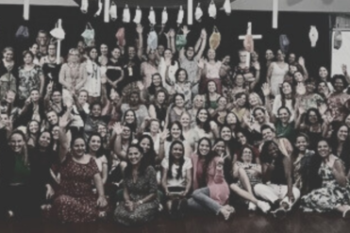Faithfulness with Time
“But what do I do?”
My very first memory of life in ministry was a question. I was serving as an intern for a semester at First Christian Church in Chicago and I had a desk in a small office that doubled as a storage space behind the old wood-floor gym that was a part of the church building. I remember sitting at the desk and feeling a strange new sense of time. It felt like I was on a different clock. There was no syllabus, no class schedule. I had a small list of things I knew needed to get done over the first few days but there was also a much larger list of less concrete things that were my responsibility during my time there. There were objectives I could not cross off a check list as “Done”: Build relationships with students, learn about the neighborhood, create a circle of volunteers who know and trust you. I had to figure out how to move in a world with less structure but higher stakes.
I had to figure out how to move through time.
It’s twenty-ish years later and I am sitting at a desk in a church office with a new job. There is a short list of things I know need to happen this week and a second list of things I know need to happen over the next twenty years or so, God willing and rising creeks-willing. I know now what a strange work ministry is—how it’s a wild mix of planning and improvising, of events on the calendar and moments that defy clocks. I know how tangled it can be when you have a day set aside to work on creative, Spirit-guided projects that will serve the community but then someone in the actual community shows up and fills that time instead.
I know the way I move through this time is a reflection of my own ingrained habits and needs, but I am also often battling expectations attached not only to supervisors and boards but to theological images and ecclesiological conversations. I want the way I spend my time to be a reflection of my attempt to follow Jesus, to live by the wisdom of the Spirit, to serve the church with integrity and excellence. But I know the Five Keys or the Ten Principles or the Three Tools of Time Management hardly ever help when the real day gets going.
Nevertheless, here are Two Contradictory Rules I Hold Onto When the Clock is Running:
1. Create rhythms you can keep and that will keep you.
Years ago, Info We Trust put out research on the daily habits of creative geniuses. They put what they learned about the days of people like Mozart and Maya Angelou on an actual clock. (https://infowetrust.com/project/routines) I found it so helpful to see how often they stopped their work to take a walk, or in many cases, smoke a cigar or drink whiskey. Many of them also had patterns of working and then seeking feedback or conversation. It’s freeing to see the ways their clocks match and the ways they’re different. The visual is a reflection of people who know what works for them to get work done.
While ministers can’t always control how our days go, we can work to sort out what patterns and rhythms match our wiring. If we know taking a walk in the middle of the day will help us to see the hand of God in the world, we need to try and keep that habit. If we know we need some silence or prayer before meetings, we need to keep that on our daily clock. Creative geniuses or not, we may also learn from them how to incorporate other people into our rhythms. Maybe we focus on relationship-building on Tuesdays and Wednesdays so that we’re more likely to have a quiet Thursday.
The importance of these rituals is having some order so you are ready for the disorder that will come. After all, it is God who put the skies on a schedule.
2. Break the rhythm in ways that keep you from breaking.
Rituals do all kinds of beautiful work in us. They form us and slow us down. They help us pay attention to what matters most. They help us to contain the chaos. But sometimes, we need some chaos. Or we at least need moments that revitalize us and renew us. Every once in a while, the most faithful thing we can do is to toss the schedule aside and see where the day takes us. If you host most of your meetings in the church building, try a coffee shop meeting instead. If most of your conversations are at coffee shops, see what happens when you walk around a park instead. If you always start meetings with prayer, go wild and read a Psalm together.
One of my favorite songwriters, Josh Ritter, wrote an article years ago about his songwriting process. He described his creative process as “Feeding the monster.” He said when he needs to create or generate output, he will switch up what kind of input he takes in. When the work of ministry starts to feel overwhelming or underwhelming, we may need to change our monster’s diet. Find a new writer, buy new pens, sit in a different corner. See if the world can look fresh again.
Breaking rhythms on your own terms may help you manage the frustrations that come when other people throw your schedule off. We know from the Gospels how often Jesus slipped away by himself to pray. But once in a while, his disciples also found him where they did not expect him, talking with a woman by a well, or entertaining kids, or taking a walk across the sea.
A clock of Jesus’ life would contain all the patterns he kept and all the ones he broke wide open. Our attempts at following him ought to fit both on and off the clock.





